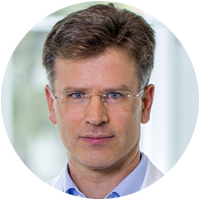Christian Müller, MD | Training to Teach in Medicine

When Christian Müller, MD, a seasoned Ear, Nose and Throat physician at the Medical University of Vienna, first came upon Harvard Medical School’s Training to Teach in Medicine program, he knew it was exactly what he needed. With over two decades of clinical experience and a budding interest in medical education, Müller found himself at a crossroads. His colleague, who had been responsible for student teaching at the university, had recently retired, leaving Müller as the only one interested in taking over the role. Despite his passion for teaching, he felt unprepared and lacked formal training in educational methods. The Training to Teach program offered the perfect opportunity to bridge that gap.
A New Role and a New Challenge
Müller’s journey into teaching was not a sudden one. His career in otolaryngology spanned 20 years, during which he built a strong reputation in clinical practice and research, particularly in olfaction and rhinology. His passion for teaching had always been simmering under the surface, but it wasn’t until his colleague’s retirement that he considered taking on a more significant role in student education.
As Müller contemplated this new responsibility, he realized that while he enjoyed teaching, he lacked the formal knowledge and skills to do it effectively. “I liked teaching students, but I was not an expert in this,” he admitted. This realization led him to explore options for professional development, and that’s when he discovered Harvard Medical School's Training to Teach program—a six-month certificate designed to equip medical professionals with the tools and techniques needed to become effective educators.
From November 2022 to June 2023, Müller immersed himself in the program, which combined theoretical learning with practical application. The curriculum included two intensive three-day online sessions, with additional live events and team assignments scheduled throughout the course of study. Participants came from diverse backgrounds and locations, forming a global network of educators. Müller’s team included colleagues from the countries of South Africa, Georgia, and Serbia, each bringing their unique international perspectives to the table.
One of the most valuable aspects of the program, according to Müller, was the capstone project, which required participants to integrate what they had learned into a new initiative at their home institutions. For Müller, this meant developing a new course for fifth-year medical students. “I created a new training program in our department with what I learned in this course,” he explained. The program, which focused on case-based collaborative learning was well received by the students, who appreciated the interactive and feedback-driven approach.
Implementing Change and Inspiring Others
The impact of the Training to Teach program extended far beyond the capstone project. Müller found himself continually applying the techniques and principles he had learned, both in his own teaching and in efforts to improve the overall educational environment in his department. One of the key lessons he took away from the course was the importance of active learning and providing regular feedback to students. “Often, it’s better to talk less to the students,” Müller noted, emphasizing the shift from traditional lecturing to more interactive teaching methods.
Inspired by the success of his capstone project, Müller began to think about the broader implications of what he had learned. He realized that he needed to share his knowledge with his colleagues to elevate the quality of education in his department. “The best thing to do is to teach the other teachers,” he said. With this goal in mind, he prepared a training session for his fellow educators, focusing on the essentials of effective teaching that he had learned at Harvard Medical School. This initiative, although still in the planning stages, represents a significant step toward creating a culture of continuous improvement and innovation in medical education at the university.
Why Training to Teach Stands Out
Reflecting on his experience, Müller is unequivocal in his praise for Training to Teach. He describes it as the best course he has ever attended, highlighting its practical orientation and the immediate applicability of learned skills. Unlike more theoretical programs, which can be overwhelming and difficult to implement, Training to Teach provided Müller with a clear roadmap for success in the classroom.
The program’s emphasis on real-world skills and its blend of theory and practice particularly appealed to Müller. He appreciated the way the course started with the basics, making it accessible even to those without prior experience in teaching. Yet, despite its foundational approach, the program maintained a high level of rigor, covering topics such as curriculum development and collaborative learning in depth.
Its focus on motivation and self-reflection is another key factor that sets the program apart. Early on, participants were encouraged to consider why they wanted to teach and what they hoped to achieve. This introspection, combined with the program’s comprehensive content, left Müller feeling empowered and inspired. “I’m much more motivated now, and I don’t feel overwhelmed by the work,” he shared.
As Müller continues to refine and expand the teaching methods in his department, he remains deeply grateful for the opportunity to have participated in the Training to Teach program. The experience not only has transformed his approach to education but also has reignited his passion for teaching. He now looks forward to helping his colleagues enhance their own teaching practices, thereby benefiting countless students in the years to come.
For those considering the program, Müller offers this advice: “It’s the best course I’ve ever attended in that enables you to provide medical students with very good teaching methods. It’s a wonderful thing if you’re engaged in teaching at a university or any other department. But be prepared—it requires a significant time investment. However, the rewards are well worth it.”